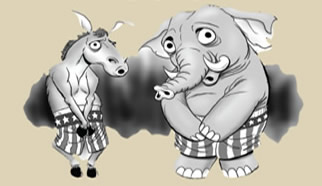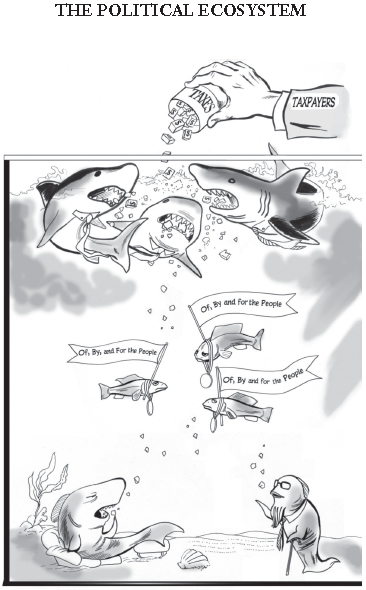 In the two years prior to my congressional run, I was focused on creating solid public policy for the constituents in my legislative district. I was honored to represent the Fifty-sixth House Assembly District, and I was focused on just doing my job. Many accolades in a variety of media sources were offered on the reforms I had led since I took office in 2001.
In the two years prior to my congressional run, I was focused on creating solid public policy for the constituents in my legislative district. I was honored to represent the Fifty-sixth House Assembly District, and I was focused on just doing my job. Many accolades in a variety of media sources were offered on the reforms I had led since I took office in 2001.
In fact, the Small Business Administration in Washington DC wrote a letter to my legislative office, telling me that without my leadership, the regulation bill would not have passed. I didn’t use that letter, on the advice of the National Federation of Independent Business president, because it may have angered my party’s leader, speaker and primary opponent.
It was my practice to read constituent letters, e-mails and trends from my district in the state legislature. Books such as the World is Flat and Manufacturing Trends and Reports from authors who wrote ahead of the business and economic curve became important, so that I could anticipate the competitive needs of major employers in my state.
I believed then, as I believe now, that if you are busy doing something for someone else, you are not swept up with the pretense of “being somebody.” More important, if you earn your own way, you cannot be bossed or bought.
In spring 2003, just two years before my first conversations about running for U.S. Congress, a story ran in the state’s largest newspaper that riled political rivals in my own political party. The Milwaukee Journal Sentinel published “One of Four—Up and Coming Leaders in the Republican Party.”
The four rising stars identified were Paul Ryan, a young congressman; Mark Green, another congressman with ambitions to become governor; Scott Walker, who had recently become Milwaukee County Executive; and me. I was described as the “mother of all education and health-care reform.” The chatter about my early reform initiatives created a buzz that went through the editorial boards and the lobby corps alike.
I was too busy working to notice, but my competition noticed.
It wasn’t until an attorney with Foley and Lardner and former GOP political director spoke to me privately in my office that I began to realize the stir that article created. He said, “One day soon you are going to have a competitive race and you will move up where you belong.”
I was taken aback by his statement for the moment but continued my path of working for major solutions to major problems of the day. I was already someone, I thought, but I was too busy “doing things” to care or to notice. I never saw the angst and anger brewing in my political party’s front row or the curve ball that was to be thrown at me in 2006…To continue reading this book, get your copy of “What Sex is a Republican” in paperback or Kindle edition on Amazon.
About the Author:
Terri McCormick is an author, policy expert, educator, and former state representative to the Wisconsin State Legislature. Today, she offers her expertise in public and government relations through McCormick Dawson CPG Ltd., a trusted consultancy of independent contractors.
Ms. McCormick serves as president and CEO of the company, drawing from more than two decades of professional experience, a strong educational foundation, a host of industry-related publications, and a multitude of accolades, awards and formal recognitions. Holding a Master of Arts in administrative leadership from Marian University, and a Bachelor of Science in political science and public administration from the University of Wisconsin, Ms. McCormick received both degrees with high honors.
“What Sex is a Republican?” is sold on Amazon in both the paperback edition as well as Kindle edition. Read reviews on Amazon here.

 In the world of political manipulation, stereotypes of ethnicity, gender and religion pose would-be barriers in the minds of some of the voting public. When these stereotypes are used in conjunction with insider political class/fish-tank politics or “food for favors,” corruption becomes the culture. Simply, the partisan bickering and rancor creates an illusion to most of us in the general public, clouding the reality of ego and power needs of the front row. Politics presents an equal party opportunity for greed, corruption and power mongering—call it tomfishery in the ecosystem.
In the world of political manipulation, stereotypes of ethnicity, gender and religion pose would-be barriers in the minds of some of the voting public. When these stereotypes are used in conjunction with insider political class/fish-tank politics or “food for favors,” corruption becomes the culture. Simply, the partisan bickering and rancor creates an illusion to most of us in the general public, clouding the reality of ego and power needs of the front row. Politics presents an equal party opportunity for greed, corruption and power mongering—call it tomfishery in the ecosystem. As you may recall, President George W. Bush’s final days in office in 2008 were marked by a burgeoning banking crisis, caused in large part by the collapse of the real estate and housing market, which led to record foreclosures and bankruptcies, which further broke the banking industry, which had overleveraged and overvalued homes, and gave what some consider unethical home loans on balloon payments to people who could not afford them.
As you may recall, President George W. Bush’s final days in office in 2008 were marked by a burgeoning banking crisis, caused in large part by the collapse of the real estate and housing market, which led to record foreclosures and bankruptcies, which further broke the banking industry, which had overleveraged and overvalued homes, and gave what some consider unethical home loans on balloon payments to people who could not afford them. A political animus (political animal) has little to do with gender, ethnicity or religion. In fact, gender is indeterminable. Far beyond any differences in anatomy or stereotypes of male or female; black, white, Asian, Latino, or Native American; or religion is a psyche that can only be attributed to the political class. All we need do is study the proverbial political fish tank to cast some light on what is meant by “political animus.”
A political animus (political animal) has little to do with gender, ethnicity or religion. In fact, gender is indeterminable. Far beyond any differences in anatomy or stereotypes of male or female; black, white, Asian, Latino, or Native American; or religion is a psyche that can only be attributed to the political class. All we need do is study the proverbial political fish tank to cast some light on what is meant by “political animus.” In March 2006, Max Bowen, a citizen of Neenah, Wisconsin, wrote an opinion column for the Appleton Post Crescent newspaper: “The GOP’s Top-Down Style Is Unfit for Democracy!”
In March 2006, Max Bowen, a citizen of Neenah, Wisconsin, wrote an opinion column for the Appleton Post Crescent newspaper: “The GOP’s Top-Down Style Is Unfit for Democracy!”

